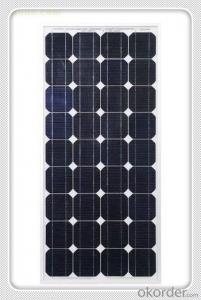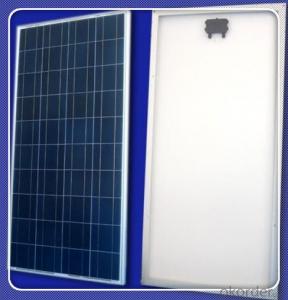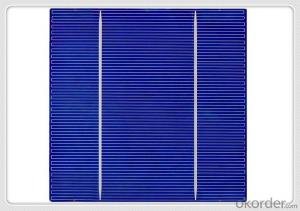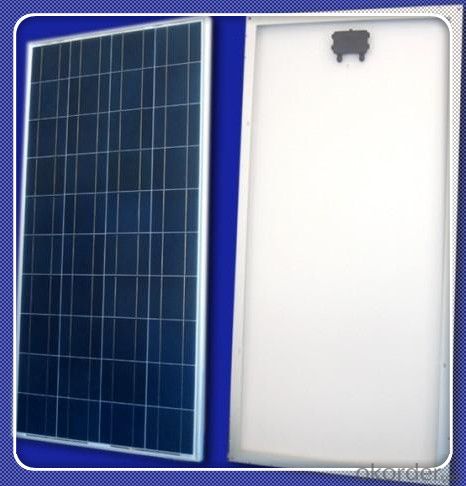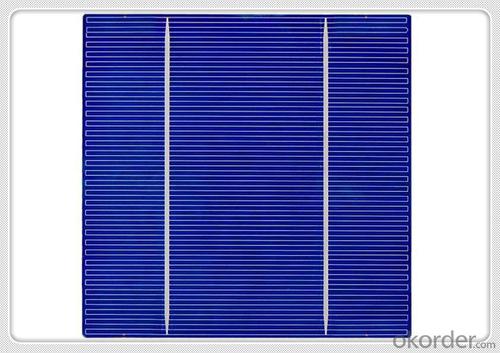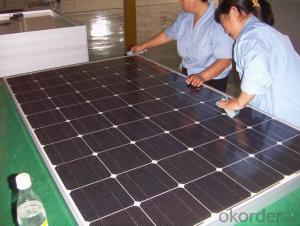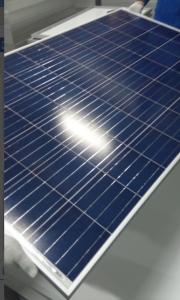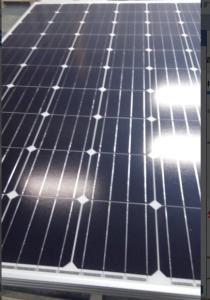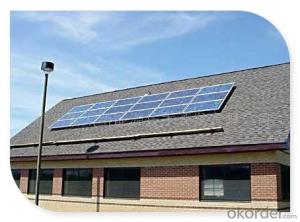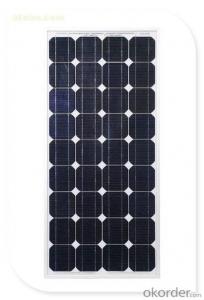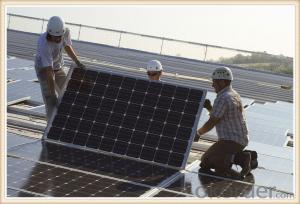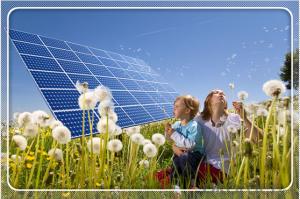Alliant Energy Solar Panels:85w Efficiency Chinese Solar Panels 5-200w for Sale
- Loading Port:
- China main port
- Payment Terms:
- TT OR LC
- Min Order Qty:
- 10000 watt
- Supply Capability:
- 100000 watt/month
OKorder Service Pledge
OKorder Financial Service
You Might Also Like
Specification
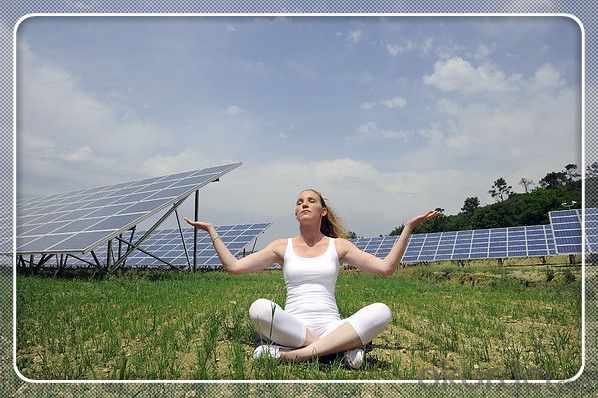
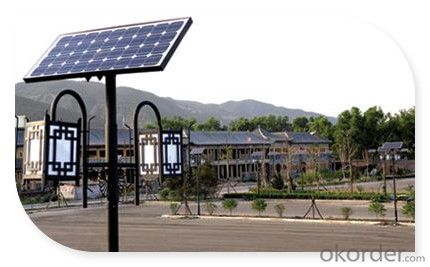
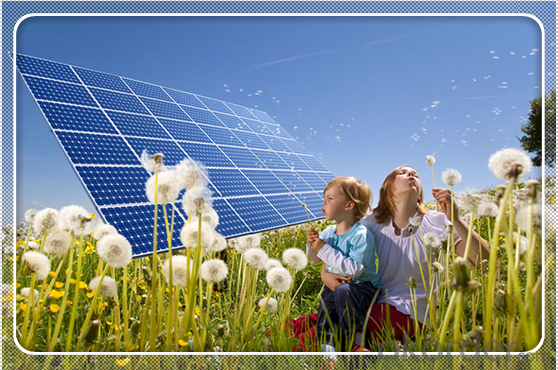
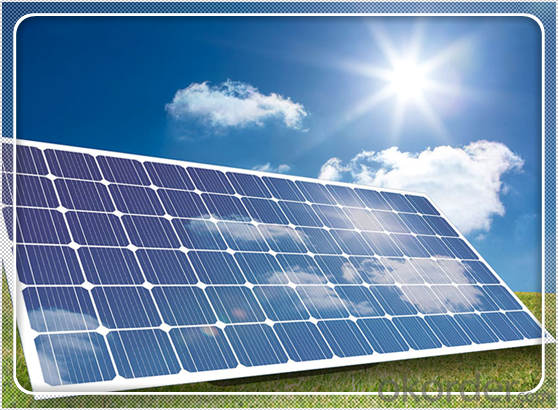
Solar Module Introduction
Solar Module is the core part of solar PV power systems, also is the highest value part of it. The function of Solar Module is to convert the sun's radiation to electrical energy, or transfer it to battery and store in it, or to drive the load running.
The Product has been widely used in space and ground, it mainly used for power generation systems, charging systems, road lighting and traffic signs areas. It could offer a wide range of power and voltage, and with high conversion efficiency, and long service life.
Solar modules use light energy (photons) from the sun to generate electricity through the photovoltaic effect. The majority of modules use wafer-based crystalline silicon cells or thin-film cells based on cadmium telluride or silicon. The structural (load carrying) member of a module can either be the top layer or the back layer. Cells must also be protected from mechanical damage and moisture. Most solar modules are rigid, but semi-flexible ones are available, based on thin-film cells. These early solar modules were first used in space in 1958.
Electrical connections are made in series to achieve a desired output voltage and/or in parallel to provide a desired current capability. The conducting wires that take the current off the modules may contain silver, copper or other non-magnetic conductive transition metals. The cells must be connected electrically to one another and to the rest of the system. Externally, popular terrestrial usage photovoltaic modules use MC3 (older) or MC4 connectors to facilitate easy weatherproof connections to the rest of the system.
Secification
Model Type | |
Peak Power-Pmax(W) | 5-200W |
Open Circuit Voltage-Voc(V) | 44.2 |
Maximum Power Voltage-Vmp(V) | 36 |
Short Circuit Current-Isc(A) | 5.4 |
Maximum Power Current-Imp(A) | 5 |
Maximum System Voltage | 1000V DC |
Maximum Series Fuse Rating | 10A |
Power Tolerance | -1~+3% |
Temperature Coefficients of Pmax | -0.45%/℃ |
Temperature Coefficients of Voc | -0.348%/℃ |
Temperature Coefficients of Isc | 0.031%/℃ |
Nominal Operating Cell Temperature | 44.5±2℃ |
Standard Testing Condition(STC) | Irradiance:1000W/m²;Temperature:25℃;AM=1.5 |
Qualification Test Parameters | |
Operating Temperature | -40℃~+85℃ |
Storage Temperature | -40℃~+85℃ |
Pressure Bearing | ≥5400Pascal/m² |
Wind Bearing | ≥5400Pascal/m² |
Mechanical Characteristics | |
Cell Size | Mono 125*125mm±0.5 |
No.of Cells | 72pcs(6*12) |
Dimension | 1580*808*40mm |
Weight | 15.5Kg |
Glass | 3.2mm High Transmission,Low Iron |
Frame | Anodized Aluminum Alloy |
Junction Box | IP65Rated |
Internal Diodes | 3 Bypass Diodes |
Cable | 1*4.0mm² Length 900mm |
Images
Packing & Shipping:
We have rich experience on how to pack the panels to make sure the safety on shipment when it arrives at the destination.
The normal size is packed by 25pcs/ carton / pallet. Paper carton for FCL shipping and wood carton for LCL shipping.
Warranty:
For c-Si panel: 25years output warranty for no less than 80% of performance, 10 years output warranty for no less than 90% of performance. Free from material and workmanship defects within 5 years.
For a-Si panel: 20 years output warranty for no less than 80% of performance, 10 years output warranty for no less than 90% of performance. Free from material and workmanship defects within 2 years.
FAQ:
(1)What price for each watt?
It depends on the quantity, delivery date and payment terms.
(2)What is your size for each module? Can you tell me the Parameter of your module?
We have different series of panels in different output, both c-Si and a-Si. Please take the specification sheet for your reference.
(3)Can you provide the peripheral products of the solar panels, such as the battery, controller, and inverter? If so, can you tell me how do they match each other?
Actually we are only manufacturer of solar panels, but we could try to source them for you in China if you need. We could provide you an optimal system design to instruct you how to install.
(4)Do you have the CE, TUV, UL Certification?
We’ve already passed all the tests, and any certificate is available.
(5)Have you ever sold your products to companies in my country?
Of course, we have customers in all general PV markets, but I think we should expand our market share along with the market growth.
(6)When did your company set up? You are a new company, how can I believe your quality?
We entered into Solar PV industry in 2005, now we have several plants in manufacturing of a-Si and c-Si panels, and our capacity is 220MW per year. Till now we have already passed all the tests by authorized laboratories, e.g. TUV, VDE, UL.
(7)Can you help us install the module if we cooperate with you?
We haven’t entered into installation sector, but we have the plan in near future.
(8) How do you pack your products?
We have rich experience on how to pack the panels to make sure the safety on shipment when it arrives at the destination.
(9) Can you do OEM for us?
Yes, we can.
(10)Can we visit your factory?
Surely, I will arrange the trip basing on your business schedule.
- Q: Ok so i can have a problem i have two 5 watt 2 volt solar panels a 2 volt battery and a 400 watt ac 2 volt dc inverter i believe im only getting 5 watts from from my solar panels thats the equivalent of one is there any way i could get full voltage from my solar panels without theoretically burning my wallet.. please help
- I think you need to take some basic courses on electricity. Usually, 8 volt solar panels are required to charge 2 volt batteries. The voltages of photovoltaic cells are set by the material they are made of, only current changes. If you hook up a 2 V solar panel to a 2 V battery, no current will flow, nothing would get charged. You would need some elaborate DC to DC voltage converters to charge a 2 V battery from 2 V solar panels. Solar panels can be connected in parallel or in series, as you've made the mistake of buying 2 V solar panel, you would have to wire them in series and have a charge controller that could limit the voltage of the charge. Did it ever occur to you that two 5 watt solar panels would not be able to provide the power needed by a 400 watt inverter? You're just running off your battery with your set up. Solar power is expensive power, you can not have solar without burning a hole in your wallet.
- Q: i hav e a project for school we need to calculate cost to buy and install solar panels in our school
- to okorder / you should really be able make report with this informatin. So for your school it would cost millions, you need to figure out how many kilowatts your school use, then use the information above to calculate how large of system would be required you will be very impressive and the most informed person in your school.
- Q: How do solar panels affect the property's energy efficiency rating?
- Solar panels can significantly improve a property's energy efficiency rating by generating clean and renewable electricity. As they harness the power of the sun, solar panels reduce reliance on traditional energy sources, resulting in lower energy consumption and reduced greenhouse gas emissions. This increased energy efficiency positively impacts the property's overall energy performance and can potentially lead to improved ratings and lower utility bills.
- Q: Can solar panels be used for powering a farm or agricultural operation?
- Yes, solar panels can be used to power a farm or agricultural operation. Solar energy can be harnessed through photovoltaic (PV) panels and converted into electricity to meet the energy demands of various agricultural activities such as irrigation, lighting, and running machinery. Solar power offers a sustainable and renewable energy source, reducing reliance on fossil fuels and minimizing operational costs for farmers. Additionally, solar panels can be installed on unused land, rooftops, or even integrated into greenhouses, making them highly adaptable for agricultural settings.
- Q: We see increasing, what appear to be, solar panels on electric poles?
- Solar powered street lights . They work really well but expensive
- Q: How do solar panels affect insurance rates?
- Solar panels can generally have a positive impact on insurance rates. While the installation of solar panels may slightly increase the dwelling coverage, the potential savings on electricity bills and the added value to the property can often outweigh any additional costs. Additionally, some insurance companies offer specialized policies and discounts for homes with solar panels, making it a favorable choice for homeowners.
- Q: Are there any safety precautions to consider when installing solar panels?
- Yes, there are several safety precautions to consider when installing solar panels. Firstly, it is important to work with a licensed and experienced professional who is trained in solar panel installation to ensure proper installation and minimize the risk of accidents. Additionally, it is crucial to turn off all electrical power and follow proper electrical safety procedures before installing solar panels. Adequate fall protection measures should be in place, especially when working on rooftops or elevated areas. It is also important to consider the weight and structural integrity of the roof to ensure it can support the panels. Lastly, proper grounding and wiring techniques should be followed to prevent electrical hazards.
- Q: Can solar panels be used in areas with limited access to electricity?
- Yes, solar panels can be used in areas with limited access to electricity. This is because solar panels generate electricity using sunlight, so as long as there is sunlight available, they can generate power. In fact, solar panels are often used as a sustainable and reliable source of electricity in remote or off-grid locations where traditional power infrastructure is not available or feasible.
- Q: Can solar panels be installed on greenhouses?
- Yes, solar panels can be installed on greenhouses. In fact, it is a popular practice as it allows for dual benefits - generating clean energy while also providing shade and protection to the plants inside the greenhouse.
- Q: Are solar panels noisy?
- No, solar panels are not noisy. They operate silently as they convert sunlight into electricity without any moving parts.
Send your message to us
Alliant Energy Solar Panels:85w Efficiency Chinese Solar Panels 5-200w for Sale
- Loading Port:
- China main port
- Payment Terms:
- TT OR LC
- Min Order Qty:
- 10000 watt
- Supply Capability:
- 100000 watt/month
OKorder Service Pledge
OKorder Financial Service
Similar products
Hot products
Hot Searches
